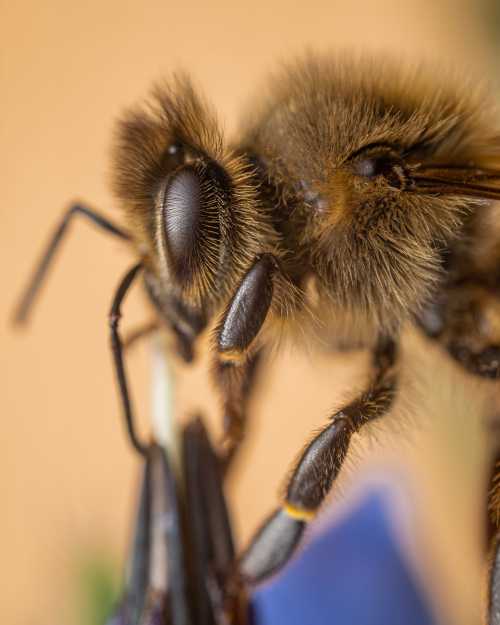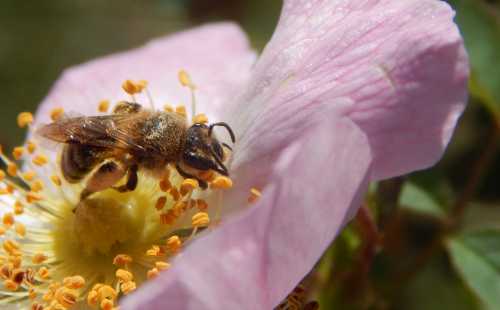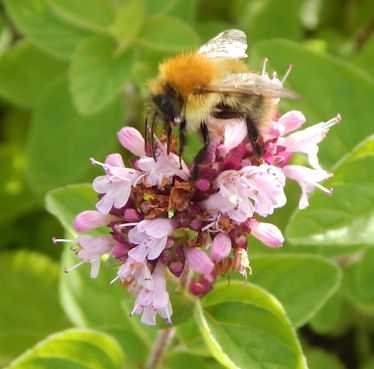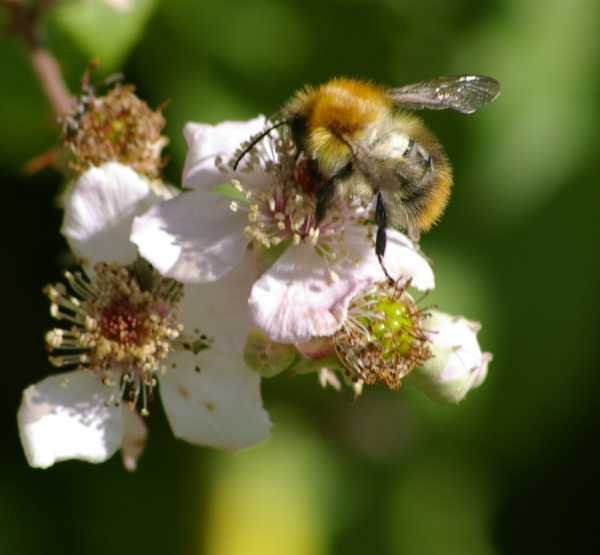10 Reasons Why Bees Are Important
Updated: November 2023
Bees really are awesome! Here are ten reasons why bees are important
and beneficial for humanity and the environment.
Some of these reasons are widely acknowledged, but perhaps there will be a few in this list you had not yet thought about!
The Importance Of Bees
1. In pollination
Bees are beneficial
because of their pollination services, helping to provide food in the form of fruits, berries, nuts - and seeds (thereby providing leaf and root crops too!).
Arguably, it is the most interesting parts of our diet that are reliant on bees (and other pollinators) for cross pollination.
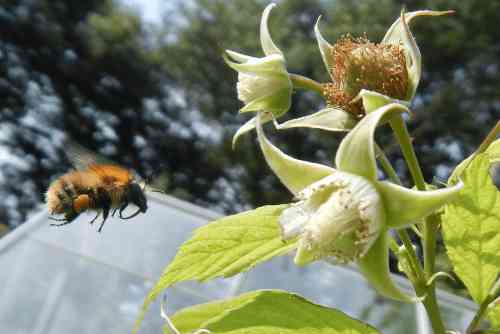 Bumble bee on its way to pollinate raspberry flowers.
Bumble bee on its way to pollinate raspberry flowers.
It's not just delicious fruits that enable us to have things like strawberry ice cream, apple pie, blueberry muffins and so on that we should consider in our diets, but also tasty vegetables like peas and beans. Foods pollinated by bees and other insects contribute significantly to human nutrient needs, including, for example 90% of vitamin C1.
In addition, research has found that there is a direct link between pollination and human health, because not only do bees and insects pollinate food crops, they may improve the nutrient value of the crops they pollinate, for example, in apples2.
Bees also help to ensure that seeds will set for many kinds of plants, thus enabling a portion to be gathered for sowing a crop for the following year. This is important even for leaf crops such as some brassicas like kale.
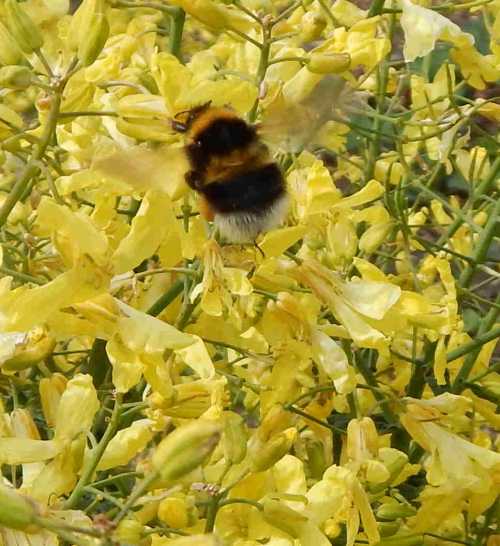 Garden bumble bee - Bombus hortorum pollinating kale flowers.
Garden bumble bee - Bombus hortorum pollinating kale flowers.It is worth remembering that if we don't have insects like bees to pollinate the plants for us, we may have to resort to other methods!
In areas of China, some crops are hand pollinated by humans who have to climb the trees and use a brush! Imagine that!
But why do they have to do it?
Answer: Because over use of pesticides means there is no longer a healthy bee population to do the work for them for free!

Read more about bee pollination.
2. Importance of bees within food webs
Bees also pollinate foods eaten by other animals and birds.
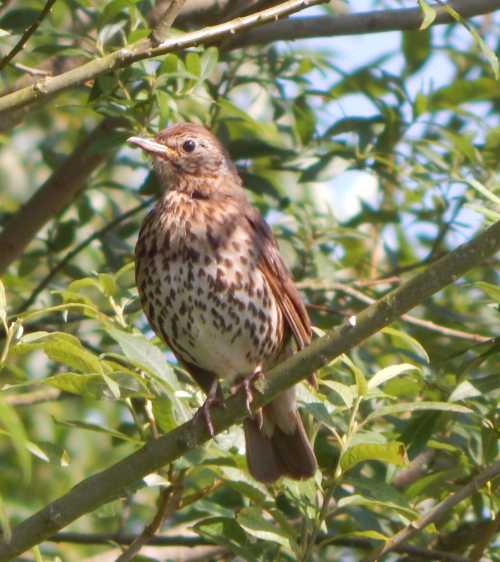 Song birds like this thrush eat berries, seeds and fruits that develop after bees and other insects have pollinated the flowers of the plant, shrub or tree.
Song birds like this thrush eat berries, seeds and fruits that develop after bees and other insects have pollinated the flowers of the plant, shrub or tree.
Birds and mammals may rely on berries, seeds
and also some fruits and nuts that are pollinated by bees and other insects.
It's worth noting that even some domesticated animals benefit from pollination too!
Cows, for example, eat alfalfa which is pollinated by bees (leafcutter bee
species are especially effective). So you see, bees play a vital role in the whole food chain!
3. Financial contribution of bees to the economy
Attempts have been made to quantify the contribution of bees to
the food crop industry, but it's very difficult.
In 2009, the value of crops directly dependent on insect pollination was estimated at $15.2bn(3), with most of that value attributed to bees.
However it was also estimated that bees contribute up to $US40 billion per annum(4). One study states that in the USA, the production of pollinator-dependent crops is valued at over $50 billion per year(5).
Personally, I think there are so many factors to consider, that calculating a figure is impossible. What we do know, however, is that bees are important!
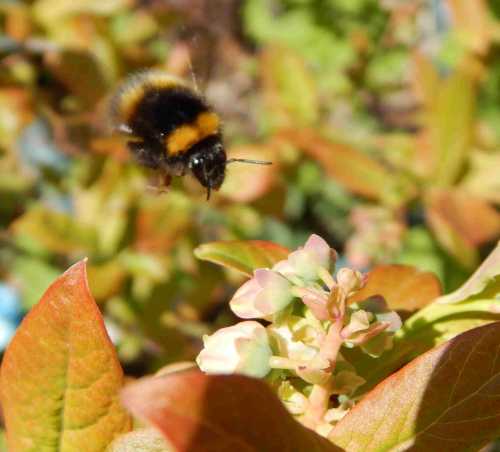 Bumble bee about to pollinate our blueberry bush.
Bumble bee about to pollinate our blueberry bush.In tandem with pollination, the beekeeping industry provides an income for beekeepers and their families through sales of goods and services that people want to buy (like honey, wax, and pollination services) as well as an income for suppliers of beekeeping equipment.
4. Bees benefit biodiversity
Quite apart from the fact that pollination is important for food production, bees contribute greatly to the countryside, to gardens and general
enrichment of landscapes.
Bees are therefore beneficial to the environment generally. They pollinate wild flowers as well as shrubs and trees, thus enhancing and ensuring plant biodiversity and beauty in landscapes and gardens.
5. Trees need bees!
It is not only flowers and
food crops that are pollinated by bees.
This point is often neglected, but many trees are pollinated
by bees (and other insects).
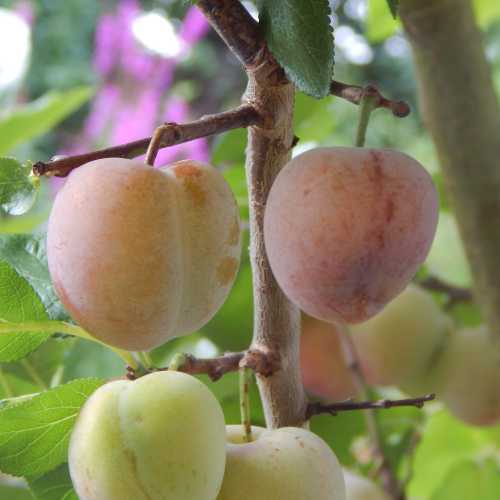 We enjoy excellent crops of plums from our tree late summer, thanks to bees pollinating the flowers on the tree in early spring.
We enjoy excellent crops of plums from our tree late summer, thanks to bees pollinating the flowers on the tree in early spring.
Horse
chestnuts, rowans, hawthorn, whitebeam, wayfaring tree, hazel, holly, alder, the
majestic native limes, pussy willow and fruit trees: cherry, pear, plum,
quince and apple are just some examples.
Bees of course, also benefit from trees. Trees in turn, support much wildlife, help to stabilize soil structure and landscapes, and are the lungs of the earth!
6. Bees save elephants - and may save human lives too!
Some of the practical ways in which bees may help communities in developing
countries are somewhat more unusual. For
example, bees are helping to save elephants and protect people in Africa, by
reducing human-elephant conflict.
Even more surprising is the fact that it has been found that bees (along with wasps) can be trained to sniff out landmines and explosives and could assist in bomb detection in land regions still tragically affected by this threat.
Bees can also be trained to detect illness in humans.
7. Bees help subsistence farmers
Bees help people and
communities, especially in developing countries.
An international charities such as Bees For
Development help communities to earn a sustainable living and pollinate food
crops through beekeeping.
8. Bees are like 'the canary in the coal mine' - they tell us about the health of the wider environment
It is not necessarily the case that the role of bees in pollination could be filled by other
insects, although they might assist in with pollination of some food crops.
Studies have repeatedly confirmed the value of bee pollination to specific crops (such as apples), and how crop production is negatively affected through a lack of bee pollination, resulting, for example, in lower yield of crops like water melons.
In any event, the factors affecting bees will often impact other pollinators, and have wider consequences for the environment generally.
Honey bees especially provide an opportunity to judge longer term environmental health, since they are one of the few insect species which produce colonies which are meant to survive for multiple years.
They also have a group of people - namely beekeepers - looking out for their wellbeing, and observing their progress (albeit not for wild honey bee colonies).
In addition, the by-products of honey, wax and pollen can also be analyzed easily for pollution, and importantly, these products can be scientifically studied over time (even within a single colony).
See Why Honey Bees Matter.
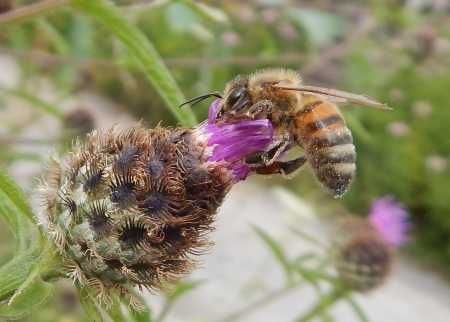 Honey bee - Apis mellifera foraging on knapweed.
Honey bee - Apis mellifera foraging on knapweed.
9. Bees have much to teach us
Bees have inspired scientific and engineering projects such as the use of hexagons in engineering. The study of bees (especially honey bees) has generated huge amounts of scientific research and they are probably the most studied creature after humans.
Bees have also inspired philosophical and poetic ideas.
Bees are awesome because they have much to teach humans about co-operation and industriousness, hence their frequent use in symbolism. Who knows what bees may teach us tomorrow?
10. Bees are part of the earth's wonderful biodiversity!
Bees are important simply because they are
a species with a right to their existence, just as any other!
All creatures play a role in this great web of life, and earth’s rich biodiversity sustains not only other species, but also humanity.
Conclusion: we need to protect bees and other pollinators...
Many people are doing their bit to help bees, especially in their gardens. A growing number of farmers are
taking the issue of biodiversity very seriously too, with pollinator margins around the perimeters of crops fields.
In tandem with these brilliant efforts, we need to cut agrochemical use. Some farmers are again coming to such a conclusion themselves, because they are increasingly concerned about soil fertility.
The overall trend then, is that as more people are becoming aware of the plight of bees and are taking action to help them. I hope you'll be inspired too!
References and resources
1. Eilers EJ, Kremen C, Smith Greenleaf S, Garber AK, Klein A-M (2011) Contribution of Pollinator-Mediated Crops to Nutrients in the Human Food Supply. PLoS ONE 6(6): e21363. https://doi.org/10.1371/journal.pone.0021363
2. Garratt, M. & Breeze, Tom & Jenner, N. & Polce, Chiara & Biesmeijer, Jacobus & Potts, Simon. (2014). Avoiding a bad apple: Insect pollination enhances fruit quality and economic value. Agriculture, Ecosystems & Environment. 184. 34–40. 10.1016/j.agee.2013.10.032.
3. Calderone NW (2012) Insect Pollinated Crops, Insect Pollinators and US Agriculture: Trend Analysis of Aggregate Data for the Period 1992–2009. PLoS ONE 7(5): e37235. https://doi.org/10.1371/journal.pone.0037235.
4. Research cited in Bumblebee Behaviour And Ecology, Dave Goulson, Oxford University Press, 2003 ISBN: 9780199553075.
5. Reilly J. R., Artz D. R., Biddinger D., Bobiwash K., Boyle N. K., Brittain C., Brokaw J., Campbell J. W., Daniels J., Elle E., Ellis J. D., Fleischer S. J., Gibbs J., Gillespie R. L., Gundersen K. B., Gut L., Hoffman G., Joshi N., Lundin O., Mason K., McGrady C. M., Peterson S. S., Pitts-Singer T. L., Rao S., Rothwell N., Rowe L., Ward K. L., Williams N. M., Wilson J. K., Isaacs R. and Winfree R. 2020 Crop production in the USA is frequently limited by a lack of pollinators Proc. R. Soc. B.2872020092220200922, http://doi.org/10.1098/rspb.2020.0922
